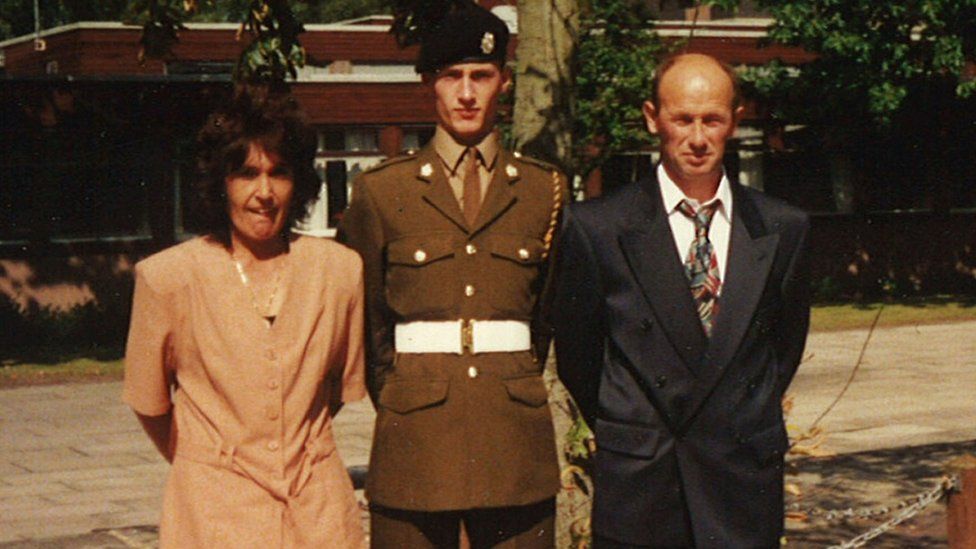Pte Sean Benton: Deepcut soldier's death was suicide, coroner rules
- Published

The death of a young soldier at Deepcut barracks 23 years ago was suicide, a coroner has ruled after a new inquest.
Pte Sean Benton, 20, from Hastings, was found with five gunshot wounds to his chest at the Surrey army base in 1995.
Delivering his conclusions at Woking Coroner's Court, Judge Peter Rook QC said three suicide notes were found after his death.
Speaking afterwards, his sister Tracy Lewis said the family would ask police to open a criminal investigation.
"Our brother Sean was funny, generous and kind hearted. He loved his family and the British Army.
"He wanted to travel the world and support peacekeeping overseas.
"What he got was bullying, violence and terrible lack of care when his mental health fell apart," she said.
Brigadier Christopher Coles said the Army has made "significant changes" in how it trains and cares for trainees.
He said: "The Army a long time ago accepted that there were significant shortcomings at Deepcut at the time of Sean's death. We took too long to recognise and rectify that situation.
"The resources available to those responsible for training, the levels of supervision for the trainees, the availability of adequate welfare facilities and the policies for using trainees for guard duties were not good enough."
Self-inflicted wounds
Pte Benton was the first of four young recruits to die between 1995 and 2002, with his death originally recorded as suicide.
"I'm satisfied that the fatal wounds were self inflicted," Mr Rook said, with the soldier firing "six shots to himself", one of which missed.
He said the first round injured the soldier, but that a second round - fired by Pte Benton when two officers arrived at the scene - proved fatal.
Notes to his friends and family were found afterwards, which Mr Rook said revealed his "settled intent to die".
They were found nearby, expressing his upset at learning he was to be discharged after a string of confrontations.
Sean Benton's family want a criminal investigation.
In a note to his parents, Pte Benton said: "I'm sorry, I'll always love you all", while in a note to a friend he said: "Learn by my mistakes."
The coroner said he had not found the soldier to have been "intentionally targeted" but that he had "frequently come to the attention of staff".
He described a litany of failures with the original investigation into Pte Benton's death, and said he was hampered by a failure to preserve evidence, poor photographs of the scene, and a lack of scrutiny of eyewitness accounts.
"Even by the standards of 1995, the investigation into Sean's death was woefully inadequate."
Summing up, Mr Rook said: "There was ample evidence available to those at Deepcut that Sean was vulnerable," but "suicidal feelings were not apparent to anyone who saw him that evening".
"It is likely Sean had an emerging emotional personality disorder," he said.
In addition, there was a failure by the Army to provide appropriate welfare supervision and support to Pte Benton.
"Had he been offered, and accepted such support, it is possible that Sean would not have taken the fatal action he did.
"However, the evidence does not establish that this would probably have been the case."
The coroner also highlighted a particular failure from senior Deepcut officers which allowed Pte Benton access to the weaponry that ended his life.
The new inquest has heard evidence from more than 170 witnesses since it began in January.
It was ordered following a campaign by Pte Benton's family, amid allegations of prolonged bullying at the base.
Over the years, families of the soldiers continued their campaigns
Shortly after the inquest began, the Army apologised to Pte Benton's family and said there were "a number of things that could and should have been better".
The inquest had heard Pte Benton died shortly after being told he was going to be discharged.
Former recruits told the hearing of bullying and harassment at the base - at one stage, Pte Benton confided in his sister he had been "shackled" and made to parade around the canteen.
Deepcut was described as an "oppressive place" with claims that "beasting" was taking place, along with humiliating punishments and physical and mental abuse.
Mr Rook said the ratio between instructor and trainee at Deepcut was "a constant concern", and there were "not enough staff to keep the trainees properly occupied".
He went on to tell the hearing of how during his time at the barracks witnesses observed a shift in Pte Benton's demeanour, with the common theme being that "he was not as bubbly as he used to be".
During a three-month warning period, he took an Anadin overdose, and it was "notable" a psychiatric assessment did not trigger a full review, he said.
He told the court there was "no doubt" Pte Benton was "on the receiving end" of punishments by senior officers and was attacked at least once by his fellow trainees.
It was "possible" but not probable these events contributed to Pte Benton's decision to kill himself, Mr Rook said.
The conduct of Sgt Andrew Gavaghan - one of Pte Benton's instructors - was key to the investigation into his death, Mr Rook said.
He had an alter ego, was prone to changes in temper, and at times "lost control of himself" and on occasions "went too far".
He told the hearing that a "closer check" should have been made on Sgt Gavaghan's treatment of trainees, and that a lack of this contributed "to his abuse of authority".
In conclusion, he said with the exception of Sgt Gavaghan he had "not found any other NCO went beyond boundaries".
Sgt Gavaghan denied allegations of abusive behaviour.
- Published20 June 2019
- Published27 March 2018
- Published26 March 2018
- Published23 March 2018
- Published22 March 2018
- Published20 March 2018
- Published21 February 2018
- Published8 February 2018